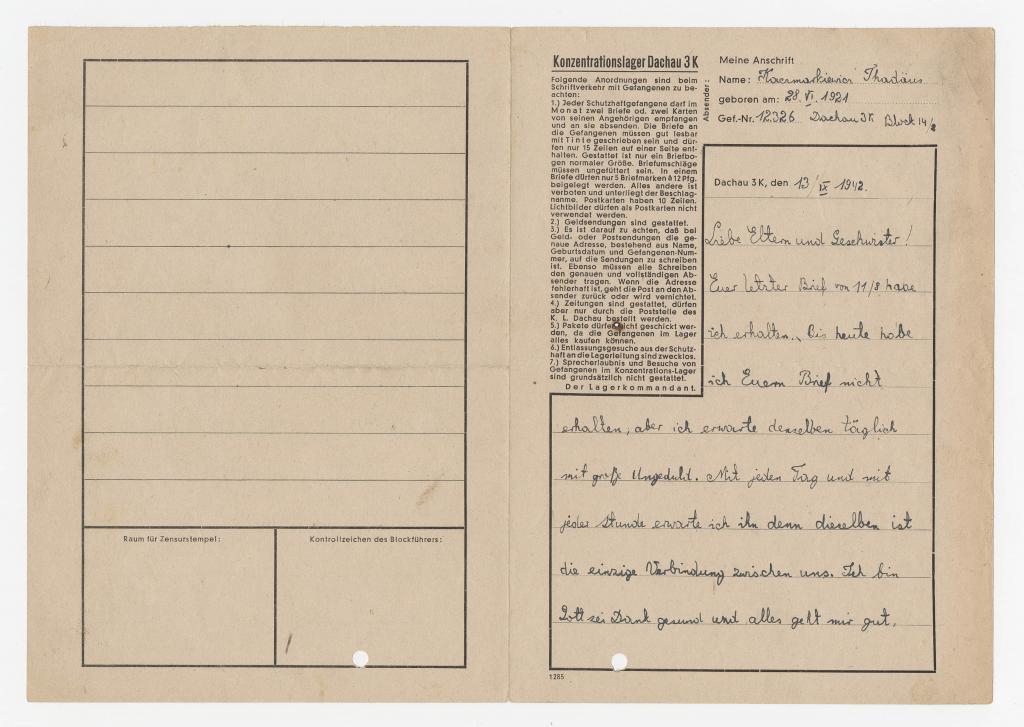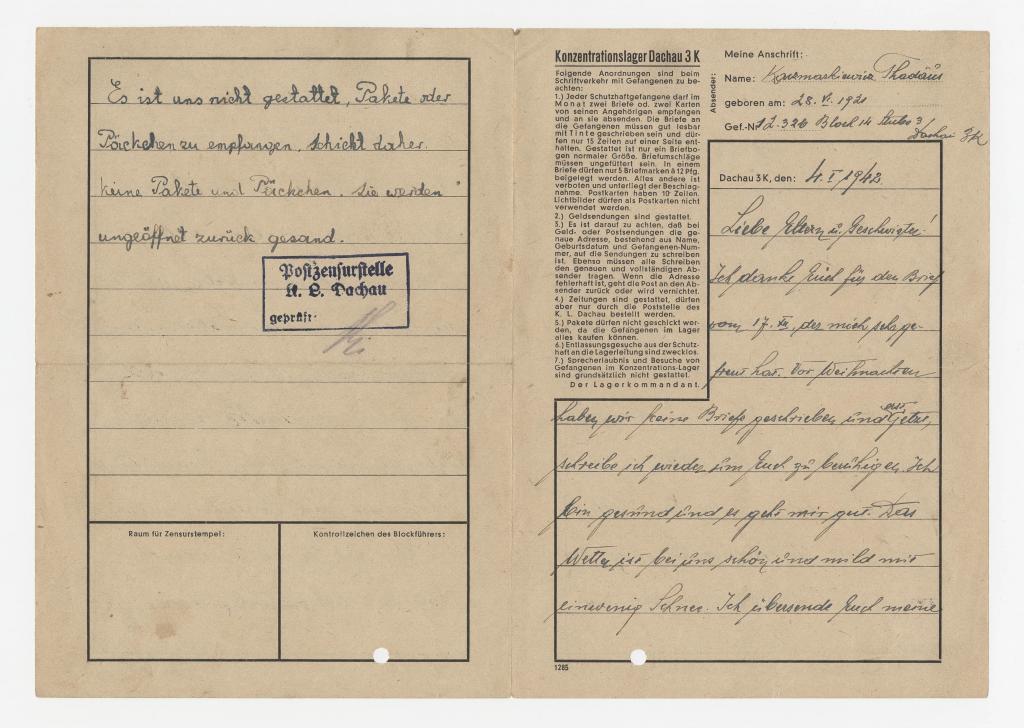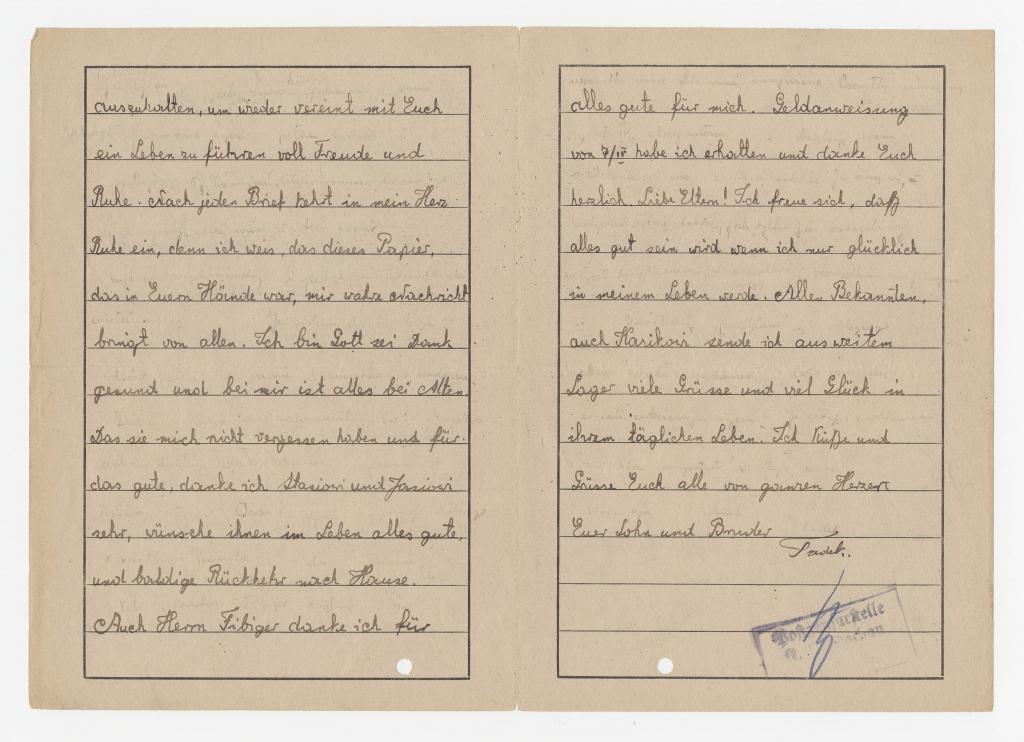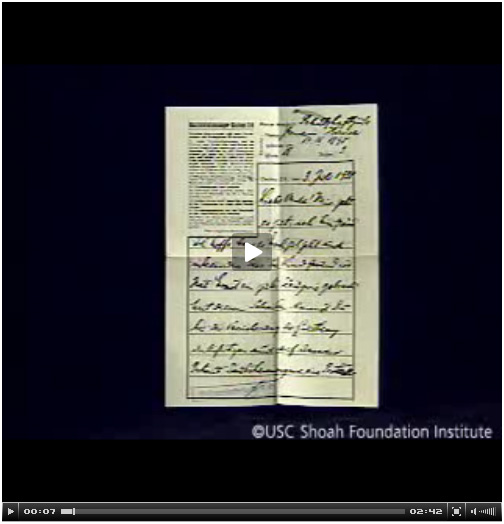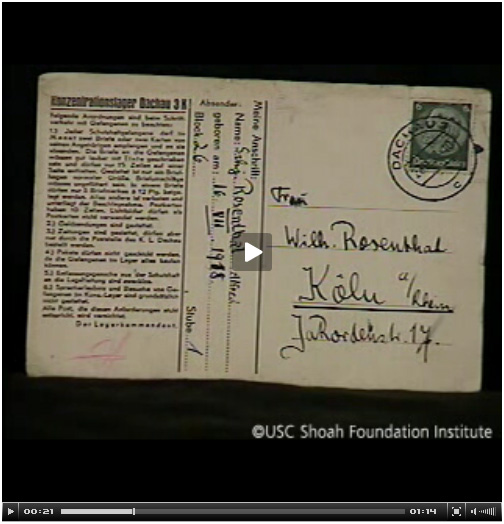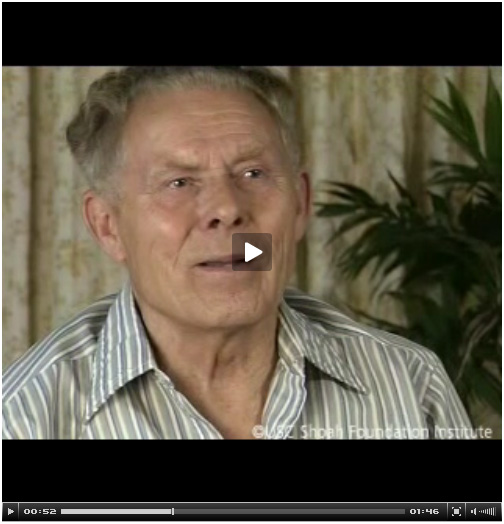Thadeus Kaczmarkiewicz, a Polish political prisoner, spent most of the war in Dachau concentration camp. He was deported to Dachau from Kalish,a town near Lodz, on 26 May 1940 and spent four years in this camp. The Brisebois collection holds 29 letters sent to his relatives in Poland between 1941 and 1942. The correspondence continued after 1942 as well, since the Lørdahl collection lists his letter of October 8, 1944. In the beginning of February, 1945 Kaczmarkiewicz was transported to the Flossenbürg concentration camp.There is no data on his further fate.
Dachau was one of the first Nazi concentration camps (it opened in 1933) and was functioning till the end of the war. In the early 1930s, Dachau was designed for political prisoners, as well as homosexuals and other “asocials.” In October 1939 the camp was completely emptied, and the inmates were transferred to other camps. In February 1940, Dachau reopened as a concentration camp. There were many nationalities there, mostly originating from Eastern Europe. Poles constituted the majority of the population by the time of liberation in April 1945. The number of inmates that passed through Dachau camp was about 250,000, of which 31,500 died or were killed. The population of Dachau reached its maximum in 1944 (100,000 inmates); when Dachau was liberated by the American troops, there were 67,664 inmates in the camp. One survivor of Dachau gives an insight on how everyday life went on in the early 1940s:
We were placed in the barracks. There were approximately 80 of us in a room. We had double deck beds. We were given a uniform, which was a miserable material made of wool, striped, with the star. The discipline of Dachau was extreme... We got up a little after four... had something that they called coffee; we were given a ration of bread for three days. In the evening we had a sort of a hot meal (cabbage, beans, lentil). We did not have any meat. But one has to get used to that.[*]
In his letters, Kaczmarkiewicz, aged 20 at the time of his imprisonment, addresses his mother and father, brother and sister, and sends regards to his friends and colleagues. Since the envelopes were not preserved, we know nothing about either his parents’ names or their location. Based on the fact that Thadeus inquires about a friend from this hometown, they were probably in Kalish during the war. The letters in the majority resemble each other in being cheerful and reassuring, always reporting about his good condition and expressing some worries about his family in a unified and similar way (I am healthy and well; have no worries about me). Thadeus thanks his relatives for their letters, acknowledges the arrival of parcels and money orders, inquires about their health and mood, and regrets that he cannot be with them. In every letter he reassures his parents of his good condition, and cheers them up by hoping that the tough times will end and that they will meet again someday:
My dears, it is Christmas again, and again, we need to talk to each other about what still remains in our hearts. Therefore, do not be sad, and your hearts should rejoice, because God can unite all of us, and therefore, I am always with you. This evening, I am at the Christmas table with you, wishing you all the best. Maybe God will let us see each other again, and then there will be no end to our happiness.[*]
I am sending you my best New Year wishes to my dear parents, Masieck and Jas, all friends and acquaintances. May dear God fulfill our New Year wishes that we could live together in peace and comfort again. Do not worry about me, dear parents, and hope for the better times and future.[*]
Although very limited in detail, these letters still reveal some bits of information about life in Dachau. For example, Kaczmarkiewicz repeatedly mentions that his work is hard and that he works six days a week; when writing about Easter holidays he notes that “the Holidays have passed quickly as a common workday,” [*] which probably means that on these days they still had to work. As a former inmate of Dachau testifies, “the work in Dachau was miserable. We had to carry rocks, and some of the older people would collapse when they picked the rocks… Another job that was given to some people was to flatten the rocks on the road.”[*] Another Dachau survivor explains that the main purpose of jobs that the inmates were given was to get rid of them. Sometimes they were unloading stones and gravel from the trucks, only to load them all back.[*] In the correspondence of Thadeus there are no complaints about the hard work but on the contrary, he repeatedly reassures his parents that the work distracts him from homesickness.
Thadeus is guided by the major principle of all prisoners in totalitarian countries – one has to refrain from pronouncing anything directly. No details are given about life in Dachau, and when speaking of his parents’ life, Thadeus communicates his questions in an indistinct and abstract form. Even names that come up demonstrate very weak connections with their actual locations or situations:
Does Jarczak live at the same position or has he already moved? What is Basia doing now, is she working together with Marysia or does she have another job?[*]
What does Basia do now and how is he in the new situation? (or position)[*]
Even such incidents as a death in the family are mentioned only indirectly, and again, without any names or references. For example, in the letter of 26 April 1942 Kaczmarkiewicz eagerly questions his parents about some unclear sad news and begs them not to conceal anything from him, since he has “so little to know.” “Have no fear, says he, because I need the first-hand news. I have come to terms with my lot.”[*] Thadeus’s suffering is always put aside, and the tone of his letters remains invariably optimistic. Only small bits of information reveal to us the degree of hardship he had to undergo in the camp. Thadeus always hails the warmth, anxiously waiting for the change of season from winter to spring. For people in the concentration camp, winter was grueling and miserable, as a former inmate of Dachau remembers, “There was no heating in the sleeping rooms, including in winter, when it was sometimes down to -20. We were close to the Alps, it gets very cold there. And yes, they cared for our health, and did not allow us to close the windows.”[*] Also, the eagerness with which Kaczmarkiewicz is waiting for the new letters is summarized in the very short yet significant phrases:
I am asking for faster responses, because the letters are the only joy for me![*]
I have been so far away from you for already two years, and my heart always pounds when I read every letter from you.[*]
Another detail that provides us with some information about the camp life is a number of the confirmations of parcel receipts. In some camps, the inmates would send the pre-printed acknowledgement as a response to the money order. In Dachau, the inmates usually used folded letters, as well as the pre-printed forms of permission to receive a Christmas package. [*] In most cases, they acknowledged the arrival of parcels by mentioning it in their letters. Thadeus Kaczmarkiewicz also does that in every letter, which means that he received the money orders every week:
I have received your money transfer (10RM) on 17.12 and I thank you with all my heart.[*]
There are no traces of food parcels that were sent to camps, since at the given time span the prisoners were prohibited to receive them. In three letters, Thadeus writes on the back of the letters the regulations that were probably dictated by the SS official: We are not allowed to receive any packages. Do not send any packages or parcels. They will be sent back unopened.[*] The rules changed only by the end of 1942, when prisoners started to be used by Germans as slave laborers and also because of the war and shortage of food.[*] Thadeus also worries about his family’s wellbeing and asks them not to send too much money. Still, the money orders and later, the food parcels provided a great support for prisoners. Charles Hirsch says that when he was imprisoned in Dachau in 1939, his mother managed to send him some money every other week, which allowed him to buy canned sardine that kept him going.[*]
The letters in the Brisebois collection demonstrate two samples of handwriting. The first and dominating sample most likely belongs to Thadeus, since the signatures on all letters are identical. Two letters sent in January, 1942 (0578-0579) are written by another person, though the signature and the note on the back of these letters matches the principal handwriting. We might suppose that, first, Thadeus did not know German well enough and therefore asked different people to write letters for him; and second, that he might have wished to pass a certain message to his family by using two different types of handwriting. The number of letters was restricted, and the inmates had to invent ways to convey things to the outside world. As noted by the VHA interviewee, his father wrote letters from Theresienstandt ghetto by himself but signed with his son’s name. “This was the way to let our relatives know that we are still well and alive.”[*]
While there is no way to know who wrote letters for Kaczmarkiewicz, his family was definitely helped by their friend or acquaintance Mr. Fibiger, whom he repeatedly thanks in the majority of his letters (Kindest regards to all colleagues and acquaintances, to Mr. Fibiger and his family;[*] Please thank Mr. Fibiger in my name for all good things he has done for me[*]). And then, in the letter of 7 December 1941 Thadeus inquires if Mr. Fibiger is sick or away, since he does not recognize the handwriting:
This time I have been astonished, since I did not recognize who wrote this letter. Is Mr. Fibiger sick or is he out of town? That’s why you do not mention that to me? Please tell me more about that. [*]
Some letters show half-erased traces of Polish translations, and this confirms that the recipients did not speak German, and someone had to translate the letters of their son.
All correspondence that circulated between Dachau and the outside world was heavily censored. In some cases, the inmates were directly instructed what to write to their relatives. The most infamous example is the Mail Action conducted in Birkenau and Bergen-Belsen, when people were forced to write postdated letters and were then killed immediately afterward. In the concentration camps, the SS personnel often dictated the first letters notifying relatives of a prisoner’s address. When one of the transports of 1939 came to Dachau, the prisoners were gathered into a huge room and the Nazis commanded them to write the following phrases to their families: “My dear... , I am fine, I am well.” These letters went to their homes. After that, they could write personal letters but their contents were also highly regulated. Every letter or postcard had rules of writing printed on the left-hand side and stated that every inmate could send only two letters or postcards per month and that every page must contain only 15 lines [*].
Because of that, the letters could be neither too long, nor too elaborate. The phrases that sounded as “I am alive and well” or “I am in a good health” were probably required in order to pass the censorship. If a censor did not like the contents of the letter, he would not let the letter through; he could cut some lines out or even punish the prisoner. In the VHA interviews, a woman whose husband was imprisoned in Dachau in 1939, shows a letter that he wrote from the camp with the lines that were cut out by a censor.[*] The Brisebois collection also holds camp letters with cut-out lines.[*]In order to convey certain kinds of information and to get real news from the outside world, prisoners invented specific codes that would help their letters get past the censors. In one of the VHA interviews, a Jewish survivor talks about passing a message to his mother-in-law that her brother, also a Dachau prisoner, had passed away. Being not allowed to talk about his death, he did that indirectly, by means of sending her his condolences.[*] Another former inmate of Dachau, while showing the postcard to the interviewer, explains how he asked his mother to contact “uncle Berthold,” a person who was neither his uncle nor anyhow related. This “uncle” was a man who could help him be released from the camp. “My mother understood that, and the message came through,”- says Alfred Rosenthal [*]
Thadeus Kaczmarkiewicz also encrypted secret messages into his letters. He asked vague questions that provided certain associations between people, whose situations and locations were known to him and his parents. The word “here” always implies being in Dachau: Dear Father! Mielcravek is not here, but you should be glad that everything goes well.[*] When someone they know is transported to Dachau, Thadeus lets his parents know by mentioning those persons in his letters. Thus, he repeatedly mentions Grzymala, his father’s friend or colleague as well as other persons that his parents knew:
Grzymalat hat was sent to Wloclawek sends you dear father greetings and also to Jakowski and all other acquaintances in Kalish.
Please let Stasio know that Dobrzanski sends him greetings and that he, like Grzymala, was in Wloclawek.
Both Grzymala and Dobrzanski were probably deported from Wloclawek (a small Polish town, also home to vast Jewish population) to Dachau. Thadeus mentions Grzymala several times (“Grzymala sends you, dear father, greetings;”[*] “Grzymala with the colleagues sends you, dear father, greetings from far away and wishing you all the best in life.”[*]) to let his father know that Grzymala is still with him. In several months his friend is deported or transferred to another block in Dachau, and Thadeus manages to notify his relatives that I do not have any news about Grzymala and Nowacki yet. They remain again where they were before.[*] In other letters Kaczmarkiewicz talks about his friend or relative Peter (or Piotr, in Polish), also a prisoner of Dachau. Before that, he keeps asking if his family knows anything about Peter, and then in the letter of 7 June 1942 Thadeus notifies his parents that Peter is now with him and that they are working together.[*] But when in the letter of 2 August 1942 he notes that Peter “is with Grymala now”[*] he implies that Peter was deported, relocated to another block, or dead.
All these messages are conveyed by the associations that require pre-existing knowledge of other people’s locations and situations. Although the percentage of these small hints is minimal, Kaczmarkiewicz still assumed a great risk, since the consequences could vary from the Postsperre (a prohibition of correspondence) to severe punishment, execution, or deportation to death camps. Roman Slupnik remembers how the phrase addressed to his parents “after the victory you may put it (the gravestone) back” was interpreted by the camp commandant as a prediction that Nazi Germany would lose the war. Because of that, he was prohibited to have any correspondence for three months and all letters that would come from his family were sent back.“They did not only punish me, they also punished my parents, and that was worse for them,” says Slupnik, “my family did not know what has happened to me.” [*]
Without knowledge of the circumstances, one can barely associate these letters with the reality of the concentration camp. Even the word lager (camp) comes up only a couple of times, in connection with safe subjects, for example, the weather: Today we had the first snow, and when we got up in the morning, the roofs of our camp were white.[*] In one of his letters Thadeus Kaczmarkiewicz hails his loved ones, and in this address one sees the greeting of a person thinking about them from a place, from which there is no return:
From the concentration camp I send greetings to Stas and Jas and wish them luck in their lives.[*]
NOTES
[1] Rosenthal, Alfred. Interview 11615, Visual History Archive. USC Shoah Foundation Institute. 2011. Web. 22 Nov. 2011.
[2] Graber, Norman, Interview 11615, Visual History Archive. USC Shoah Foundation Institute. 2011. Web. 23 Nov. 2011
[3] Landau, Abraham. Interview 9257, Visual History Archive. USC Shoah Foundation Institute. 2011. Web. 23 Nov. 2011
[4] Slupnik, Roman. Interview 3276, Visual History Archive. USC Shoah Foundation Institute. 2011. Web. 23 Nov. 2011
[5] Lørdahl, Erik. German concentration camps, 1933-1945. history and inmate mail. Vol 2. p. 148
[6] The next main change in the prisoners’ everyday life in Dachau (and the other KZs, too) took place in last quarter of 1942, when prisoners were permitted to receive packages – both from relatives and from humanitarian organizations such as Caritas and the International Red Cross. The main reason for this change was the new policy to use prisoners as slave laborers in the war industry. This change meant better conditions for the prisoners, at least for those of certain nationalities, and this included more food. (Lørdahl, Vot. 1, 38)
[7] Hirsch, Charles. Interview 3855, Visual History Archive. USC Shoah Foundation Institute. 2011. Web. 22 Nov. 2011.
[8] Bloch, Ernest. Interview 1521, Visual History Archive. USC Shoah Foundation Institute. 2011. Web. 15 Nov. 2011.
[9] Hauser, Ernst, Interview 16148, Visual History Archive. USC Shoah Foundation Institute. 2011. Web. 22 Nov. 2011.
[10] Haas, Paula. Interview 27863, Visual History Archive. USC Shoah Foundation Institute. 2011. Web. 22 Nov. 2011.
[11] Klein, Theodore. Interview 1920, Visual History Archive. USC Shoah Foundation Institute. 2011. Web. 22 Nov. 2011.
[12] Rosenthal, Alfred. Interview 18806, Visual History Archive. USC Shoah Foundation Institute. 2011. Web. 22 Nov. 2011.
[13] Slupnik, Roman. Interview 3276, Visual History Archive. USC Shoah Foundation Institute. 2011. Web. 23 Nov. 2011
